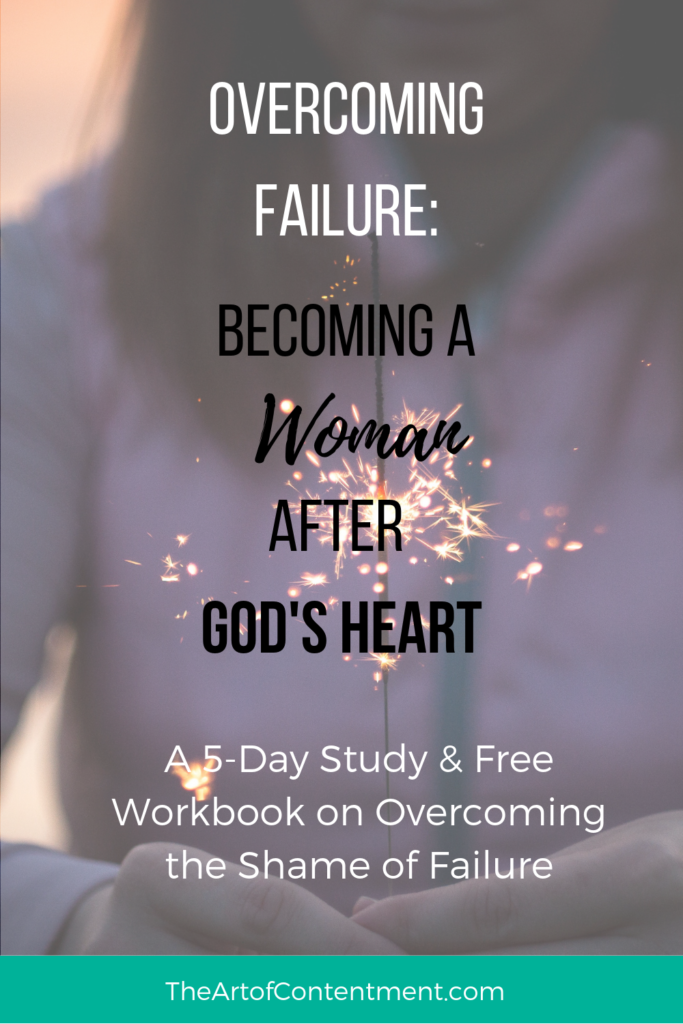This is Day 1 of a five-day study on overcoming the shame of failure so you can put the past behind you. Want to jump ahead? No problem. Click on the menu below to dive into any day of the devotional.
Guess what? You don’t have to wait for the devotionals to publish over the next few days: You can download the whole devotional with workbook, reflection questions, and printable quote art. Just scroll down to the workbook image and click! No email required.
Overcoming failure and putting the past behind us can feel like an insurmountable task. Yet this task is laid before us in hope and confidence in Jesus who gives us true freedom.
Do you remember who it was that God called “a man after His own heart”? King David, so much a hero and a legend that it’s easy to elevate him to a myth. But this man was once flesh and blood like us. And like us, he failed. Big time.

David made memorable mistakes: He and his not-so-merry band almost killed a man and the male members of his household over an insult; tens of thousands of Israelites died in a plague that was punishment for David counting his potential army instead of trusting God. Yet we remember David’s worst failure with just two people: Bathsheba and Uriah.
Weaving through the historical accounts, we’ll follow David from temptation and impulsive sin, to denial and cover up, to shame, repentance, grief and recovery.
We, too, will follow our failure through five steps:
- Denial/Ducking, Shame, Repentance, Grief, and Recovery.
Over the next five days, we are going to walk with David.
With detailed biblical accounts and a deeply personal song between a man and his God, we’ll see the story of failure and redemption unfold.
- David’s failure didn’t define him or decide his destiny with God. David was still known as “a man after God’s own heart.”
In following David’s journey, we will gain confidence, gratitude, and joy that after failing, we, like David, will still be called a woman or “man after His own heart.”
Let’s push on and put the past behind us.
Day 1
Read: 2 Samuel 11
Stage 1: Denial and Ducking
Where is the compassionate, honorable king? Where is the man touched by remorse because he cut off Saul’s robe while the king hunted for David’s life? Where is the man who welcomed a crippled man to dine permanently at the king’s table (2 Samuel 9)?
This unflattering account paints a strong contrast between warrior poet and voyeuristic adulterer. Ouch. We wait for the David we know to remember himself, to remember his God, to overcome lust and remain pure. But David failed.
We’ve failed, too. Maybe our failure was sinful, and maybe it was a poor choice that bore painful consequences.
David was about to make a choice. Until then, he’d tasted little of failure. But now the time was upon him: The moment of failure, the moment of decision – the “before” that changed the “after.”

Everything after this moment would change David’s life and the future of his kingdom. David’s bitter “after” was set in motion by a single slim moment. Our “afters” often hang on the thinnest threads, too, don’t they?
Re-read 2 Samuel 11: 2b “And from the roof he saw a woman bathing, and the woman was very beautiful.”
Living in a palace with high walls and a breathtaking view had its advantages: David could see where perhaps he should not.
Some paintings suggest Bathsheba was bathing on her rooftop, exposing herself to anyone with a higher vantage point. Yet nothing in the biblical text backs up this claim. More likely, David could see down into her house. This was David’s “before” moment: “He saw” and chose not to look away.
Maybe our failure started with a small error. We “saw” and didn’t look away. Or we made a choice with the best information we had but the information we “saw” was inaccurate. It didn’t reflect the person we truly were and are. We never imagined the consequences of our first small step toward failure.
Reflection: Think back: What was the moment when you could have made a different decision? Why didn’t you? What compelled you to choose that path?
We all know what happened next. What David intended as a single night of pleasure exploded into catastrophe when the bill came due: Bathsheba became pregnant.
David was king. If anyone could be excused for messing with another man’s wife, it was the nation’s supreme leader, right? But the thing is, a husband’s exclusive rights to his wife were highly honored in David’s culture.
Even the idolatrous Egyptians abhorred adultery. That’s why Abraham was so afraid to enter Egypt with his gorgeous wife: the Egyptians would rather kill a husband and take his wife than to have sexual relations with a married woman.
In a few months, David’s adultery would be obvious in Bathsheba’s growing belly. Something must be done. David was now in cover-up mode. His reputation and his honor were at stake. Nothing mattered more than disguising his treachery, not even a man’s life.
After failing to get honest, loyal, truly decent Uriah to go home to Bathsheba and cover up David’s sin, David took deadly action. David ducked the consequences of sin. When news of Uriah’s death arrived at the palace, David’s reaction was relief, not regret:
Then David said to the messenger, “Thus you shall say to Joab: ‘Do not let this thing displease you, for the sword devours one as well as another. Strengthen your attack against the city, and overthrow it.’ So encourage him.”
2 Samuel 11:25 NKJV
David’s self-deception was complete. He had utterly failed God, himself, his loyal servant Uriah and Uriah’s beloved wife, Bathsheba.
Biblical records don’t show David beating himself up or writing psalms about how much he reviled murdering Uriah. By all accounts, David went on with life as usual.
He ducked consequences, and he denied the truth of what he’d done.
When we’ve failed, our first reaction may have been to duck or deny the consequences. We dive into “fix it” mode, scrambling to correct or cover up.
Denial and Ducking is the first step in our Failure-Recovery path. Before we can move on, we must stop denying and dig deep. Feel the pain, name it, own it, be still within it.
Denial can also take the form of confusion. Maybe you aren’t trying to excuse yourself or avoid natural consequences, but your feelings are jumbled. You can’t make sense of how things went awry. You’re puzzled but want to pursue clarity.
Whether you’re in straight up denial or wandering in confusion, use the following questions to debrief the situation.
- How did you lie to yourself to justify your choice?
- What was the truth when you made your choice?
- What were you feeling at the moment of decision? Anger? Fear? Panic? Hope? Expectation? Entitlement?
- What information would have made a difference in your choice if you’d had the information at the time?
To the person whose choice was not sin but didn’t work out the way you hoped: Did you make the best decision you could with the information you had?
- Sometimes we figure out the “should’ve could’ves” after years of reflection and learning ourselves.
- You can’t blame your younger self for not knowing better.
Your assignment is to ask yourself: Am I still blaming myself for making the best choice I could? Am I denying myself mercy over this decision? Write a message of forgiveness to your younger self.
